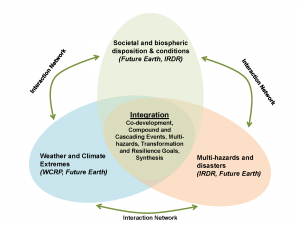Endorsing statements
by researchers, practionners and experts from Global Research Projects, IRDR, WCRP , early career scientists and colleagues from programmes and institutions collaborating with the Risk KAN
“Contemporary risk management policy only scratches the surface of risk causation. This seriously limits resilience building in poorer and richer countries alike. We still have little understanding of the cascading effects of extreme events, nor of the ways in which climatic, social and political interactions can lead to the emergence of new and dangerous combinations of hazard and vulnerability leading to disaster. The Risk KAN is an exciting and timely effort to bring climate science, risk management and development studies together to address this gap head-on.”
by Mark Pelling PhD, Professor of Geography, King’s Centre for Integrated Research on Risk and Resilience, an IRDR International Centre of Excellence, Challenge Leader, Resilience to Environmental Shocks and Change Portfolio
“iLEAPS supports the establishment of the Risk KAN and sees it as an opportunity to develop knowledge for better understanding of emergent risks and how to deal with them. Our work quantifies how interacting physical, chemical and biological processes transport and transform energy and matter through the land atmosphere interface.”
by iLEAPS
“Having the opportunity to participate in the activity of the RISK KAN makes a big difference in my career. As early career researcher this recognition of being part of this group gives me visibility in my research group in Brazil and motivates me to keep working in this area. I would like to emphasize some aspects of the KAN: during the activities (Tokyo-2017 and Paris-2018), I was able share my experiences and build a network related to extreme weather. This helped me a lot for new project proposals I am currently developing.
I would like to support other early careers to link their activities to the RISK KAN, to build partnerships contributing with my experiences in the field of extreme weather events in rural areas in developing countries, and to discuss my key research questions of the field projects during the next RISK KAN activities.”by Rodrigo Rudge Ramos Ribeiro, Brazil (Early career FutureEarth)
“The Risk KAN is an exciting new opportunity to bring together scholars working on climate extremes and emergent risks. Climate extremes and emergent risks represent a complex threat of which there is limited scientific knowledge currently and new scientific partnerships are needed to better understand the feedbacks and dynamics between different systems. Risk KAN builds a global platform for sharing and collaboration that is necessary to tackle these threats in the future. Working within the policy sciences, extremes and emergent risks are addressed by a range of societal responses, within which climate change adaptation and disaster risk responses intersect. Much is still unknown of the processes that contribute to the vulnerability of populations to risks, and here is where social sciences can be contribute to this field. Similarly, while the costs from disasters keep rising, there is little knowledge of how effective, efficient and legitimate policy responses to disasters are and over what time scales. I personally hope that the Risk KAN provide a venue for new connections outside of established communities. It is becoming clear that new knowledge partnerships are needed to better understand complex feedbacks and no disciplinary approach can alone provide sufficient knowledge to tackle extreme events and emergent risks. “
by Professor Sirkku Juhola, Urban Environmental Policy Research Group Ecosystems and Environment Research Programme, University of Helsinki, Finland
Risk KAN Partnership

